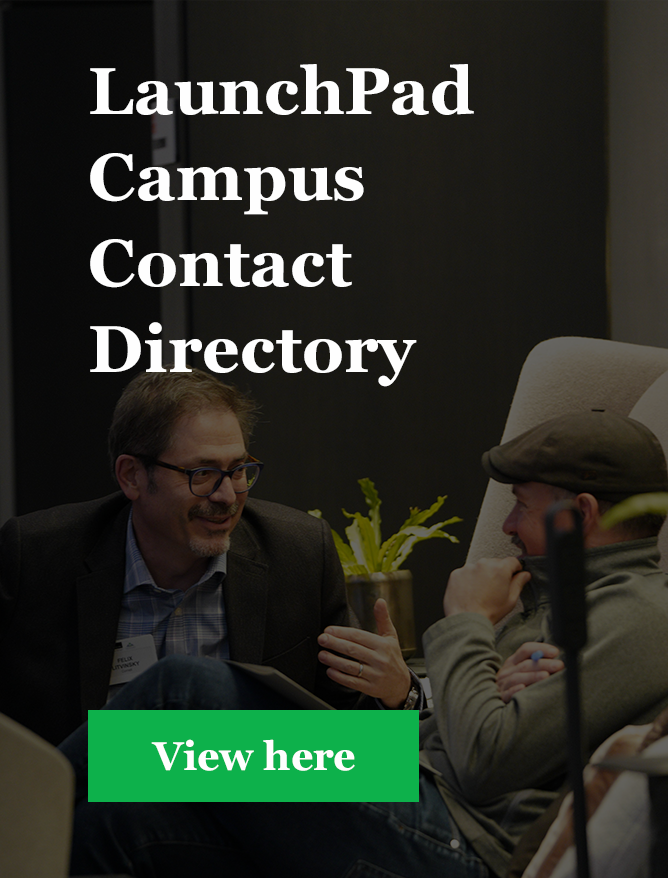One essential role of a LaunchPad campus director is helping students forge successful relationships with mentors. However, that becomes more difficult as we grow our network and leverage mentors throughout the year from around the U.S. and world. In these virtual mentorship situations, what are some best practices? And how do you guide your students to ensure their success?
Virtual working relationships of any type are hard to get right. This is even more true in a mentorship dynamic, where neither party has the inherent need that coworkers do to work together to get the job done. Geographic dispersion, sporadic or limited engagement interactions, and technological issues further complicate the matter. However, in the current global, digital, and mobile working world, excelling at virtual collaboration is not only an important entrepreneurial skill but an important career and life skill.
Thankfully Techstars and Blackstone — two globally reaching organizations — have learned a lot about successful virtual work, and we are now sharing those lessons with you.
- Choose the right students. Some students, just like some mentors, will inherently struggle with a virtual dynamic. Some may be too immature. To achieve success in this scenario, strong communication skills, the ability to work independently, high emotional intelligence, and a desire to make each interaction successful are all required. For mentoring relationships that are long term, students must be deliberate about forging social bonds. Meetings can easily become very task-focused and result in weak social cohesion where the mentor never really gets to know and care about the student as a person (and vice versa). One way to avoid this is to spend a few minutes at the beginning of every call discussing something non-business related.
- Help them prepare. Student entrepreneurs often excel at thinking on their feet and rolling with the punches. However, when it comes to virtual mentoring, this is not the time to be under-prepared. Students should research the individual ahead of time, just as if they were meeting a new mentor in person. Encourage them to investigate the mentor’s current company and role, past professional experience, and any shared background. Students should try to identify how that person’s experience might be most helpful. Confirming the date and time — and time zone! — minimizes the chance for scheduling errors. Sending an agenda in advance communicates respect for a mentor’s time and will also help the mentor prepare for a more in-depth, more strategic conversation.
- Optimize the environment. That means considering both physical and digital components of the interaction. Holding a call from a busy, loud, or overly informal setting creates a less than ideal situation. If multiple students are participating, be sure they are each able to find a calm and quiet space where they can truly focus on the conversation. Will the student be sharing any documents? Does the mentor have the necessary software to access those files? When setting the meeting date and time, also encourage students to clarify the channel for connecting with the mentor. Do both the student and mentor have Skype, Zoom, or Lifesize? Who will make the call? Confirm the channel and role, and be sure to test the technology ahead of time.

- Encourage the use of video. When it comes to in-depth conversations, email is better than text or Slack, phone calls are better than email, but video is best of all. Students can pick up on non-verbal contextual communication and avoid misunderstandings that are too easy to stumble into over the phone. Similarly, encourage your students to use screen-sharing. Make sure they are prepared to show vs. tell a mentor about their business and what they need help. That usually means leveraging a screen-share to showcase whatever they’re working on.
- Understand commitments and follow-through. Students are used to their teachers expecting accountability, but they may think this is less important with a mentor. It is not. After your student has a call with a mentor, check in with them about what asks and what commitments each made. Be sure the student is clear on expectations, timeline, and milestones. A word of caution: this can easily turn into micromanagement, which is both demotivating and inappropriate. If your student is not fulfilling the commitments they have made to their mentor, consider reducing the frequency of meetings until you are confident they are back on track.
- Meet in person. While not always an option for your students and their mentors, it is useful to recognize that there is no more efficient way to build trust and rapport quickly than meeting in person. (This fact is part of why, even with a commitment to help students where they are, in-person mentoring remains a component throughout all of our global LaunchPad programming.) When your student forms a particularly important mentor relationship with someone who could have a transformational impact on their business, consider all options for bringing them together. Even the Techstars Anywhere Accelerator is only mostly virtual — they still meet at the beginning, middle, and end of the program.
Finally, show up. This isn’t the seventh tip for success because it is, quite simply, required. Students who do not show up for scheduled virtual mentoring reflect poorly on themselves, your school, and our entire network. With LaunchPad available to more than 750,000 students a year, there is no mentor capacity for uncommitted entrepreneurs. When scheduling conflicts arise, make sure your students are communicating this as early as possible to both you and their mentors.
For more information and advice on working with a mentor, be sure to check out the Techstars Entrepreneur’s Toolkit: Engage With Mentors module.






